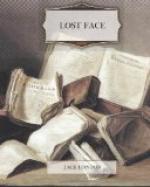“Le’s have one more,” he pleaded. “One more before I sign away a hundred thousan’ dollars.”
Curly Jim filled the glasses triumphantly. O’Brien downed his drink and bent forward with wobbling pen to affix his signature. Before he had made more than a blot, he suddenly started up, impelled by the impact of an idea colliding with his consciousness. He stood upon his feet and swayed back and forth before them, reflecting in his startled eyes the thought process that was taking place behind. Then he reached his conclusion. A benevolent radiance suffused his countenance. He turned to the faro dealer, took his hand, and spoke solemnly.
“Curly, you’re my frien’. There’s my han’. Shake. Ol’ man, I won’t do it. Won’t sell. Won’t rob a frien’. No son-of-a-gun will ever have chance to say Marcus O’Brien robbed frien’ cause frien’ was drunk. You’re drunk, Curly, an’ I won’t rob you. Jes’ had thought—never thought it before—don’t know what the matter ’ith me, but never thought it before. Suppose, jes’ suppose, Curly, my ol’ frien’, jes’ suppose there ain’t ten thousan’ in whole damn claim. You’d be robbed. No, sir; won’t do it. Marcus O’Brien makes money out of the groun’, not out of his frien’s.”
Percy Leclaire and Mucluc Charley drowned the faro dealer’s objections in applause for so noble a sentiment. They fell upon O’Brien from either side, their arms lovingly about his neck, their mouths so full of words they could not hear Curly’s offer to insert a clause in the document to the effect that if there weren’t ten thousand in the claim he would be given back the difference between yield and purchase price. The longer they talked the more maudlin and the more noble the discussion became. All sordid motives were banished. They were a trio of philanthropists striving to save Curly Jim from himself and his own philanthropy. They insisted that he was a philanthropist. They refused to accept for a moment that there could be found one ignoble thought in all the world. They crawled and climbed and scrambled over high ethical plateaux and ranges, or drowned themselves in metaphysical seas of sentimentality.
Curly Jim sweated and fumed and poured out the whisky. He found himself with a score of arguments on his hands, not one of which had anything to do with the gold-mine he wanted to buy. The longer they talked the farther away they got from that gold-mine, and at two in the morning Curly Jim acknowledged himself beaten. One by one he led his helpless guests across the kitchen floor and thrust them outside. O’Brien came last, and the three, with arms locked for mutual aid, titubated gravely on the stoop.
“Good business man, Curly,” O’Brien was saying. “Must say like your style—fine an’ generous, free-handed hospital . . . hospital . . . hospitality. Credit to you. Nothin’ base ‘n graspin’ in your make-up. As I was sayin’—”
But just then the faro dealer slammed the door.




